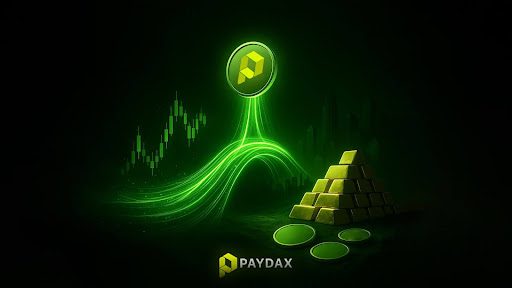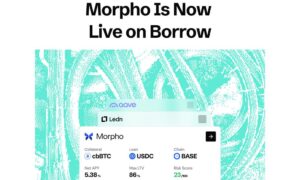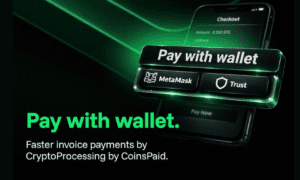Worldwide, wealth is often stored in forms that are hard to access. A farmer in Kenya may own land, a collector in Switzerland may keep a rare watch, and a trader in Singapore might hold a significant amount of Ethereum.
However, for each of them, turning these assets into cash without selling remains difficult. Banks rarely offer solutions, and when they do, the process is slow, expensive, and relies heavily on intermediaries.
PayDax Protocol (PDP) aims to rewrite this equation. By enabling both digital and real-world assets (RWAs) to move fully on-chain, it is building The People’s DeFi Bank.
On this decentralized platform, borrowing, lending, and insurance are handled through smart contracts rather than institutions. The vision is simple but powerful: turn assets into access, risk into opportunity, and control into something that belongs to the people rather than gatekeepers.
Unlocking Liquidity Without Selling
At its core, PayDax Protocol allows users to borrow stablecoins by pledging either crypto assets or tokenized real world assets (RWAs) as collateral. This enables individuals to raise capital without having to liquidate their holdings.
An Ethereum holder with 200 ETH ($600,000) can lock it on Paydax and borrow stablecoins at LTVs of 50%, 75%, or 97%. They can access up to $582,000 while still benefiting from Ethereum’s potential rise.
The principle applies to physical assets like luxury watches, gold, or real estate, which can be authenticated, stored, and tokenized on the blockchain. Collectors can then convert assets into stablecoins while retaining ownership, instead of locking items in vaults.
This blend of digital and physical collateral creates a borderless financial model where value, in any form, can be mobilized without being sold or exchanged.
A Peer-to-Peer Model for Lenders and Stakers
Borrowers aren’t the only ones who benefit. For lenders, PayDax Protocol offers an opportunity to utilize their stablecoins directly in a peer-to-peer system.
Instead of earning under 1% at a bank, they can fund overcollateralized loans and generate up to 15.2% annual percentage yield (APY). Because intermediaries are cut out, the returns are more attractive and the system more transparent.
But the real innovation is in the Redemption Pool. Here, participants act as decentralized insurers. When a borrower defaults and their collateral falls short, the pool makes up the difference, ensuring lenders are always repaid in full.
Those who stake funds into this pool can earn up to 20% APY from premiums paid by lenders seeking protection. In this way, insurance becomes a yield-generating activity rather than a cost center, transforming risk into opportunity.
For more advanced users, PayDax Protocol also enables leveraged yield farming. By borrowing additional funds, participants can farm with a larger position and capture returns as high as 40% APY. With built-in safeguards and precise collateralization requirements, the strategy balances opportunity with responsible risk management.
A Foundation Built on Trust and Efficiency
What separates PayDax Protocol from many DeFi projects is its emphasis on credibility. Too often, new platforms launch with promises but lack the infrastructure or transparency to earn user trust. Paydax approaches this differently, combining decentralized architecture with institutional-grade support.
Real-world assets on the platform are authenticated by Christie’s and Sotheby’s, two globally recognized auction houses whose expertise ensures asset legitimacy. Once validated, these assets are entrusted to Brinks, renowned for handling valuable assets for governments and banks.
Technology integrations further support the system. Chainlink oracles provide real-time price feeds for digital and tokenized assets, ensuring accurate valuations. Jumio’s verification tech handles identity checks for RWA borrowers, adding compliance.
To make the experience seamless, MoonPay enables users to easily move between fiat and cryptos through debit and credit cards, supporting direct transactions. Complementing Brinks, Prosegur adds another layer of custody and secure logistics, expanding the network of trusted safeguards for real-world assets.
Beyond their partnerships, the project maintains transparency with a fully doxxed team, dedicated developers, and a CMO-led outreach strategy. Regular AMAs, podcasts, and videos foster community engagement. With an audited contract and registered business, it emphasizes security and accountability in DeFi.
Why the PDP Token Sets the Trust Standard in DeFi
Like the Trust Wallet Token (TWT), the PDP token is at the heart of the ecosystem, built for practical use rather than speculation. Every key feature in Paydax, from governance and compliance to staking and insurance, depends on PDP. This creates a natural cycle of demand closely tied to adoption and user participation.
Holders who stake PDP contribute to the solvency of the network, earning rewards for supporting system stability. Lenders and insurers also rely on PDP to secure their roles within the ecosystem. Unlike tokens that derive value from hype, PDP’s worth is anchored in the work it enables and the activity it powers.
Seize the Presale Opportunity Before Adoption Accelerates
The PayDax Protocol (PDP) presale is currently live at just $0.015 per PDP token, providing the earliest and most accessible entry point before stage-based price increases and future exchange listings. Furthermore, early investors can take advantage of the Promo code – PD80BONUS and receive an 80% bonus on their tokens.
Unlike speculative launches based solely on promises, PayDax already operates with a functional Dapp v1.0, independently audited smart contracts by Assure DeFi, and infrastructure supported by globally recognized custodians and valuation experts.
As decentralized finance moves toward real-world asset integration, PayDax is at the forefront by combining crypto lending, RWA collateralization, and peer-to-peer insurance into a single on-chain system.
PayDax’s The People’s DeFi Bank transforms assets into access, replacing opacity with transparency, and ensuring trust through code and respected institutions. With the presale ongoing and adoption increasing, you can help shape the future of people-driven finance now.
Join the PayDax Protocol (PDP) presale:
Join Paydax Protocol (PDP) presale



































